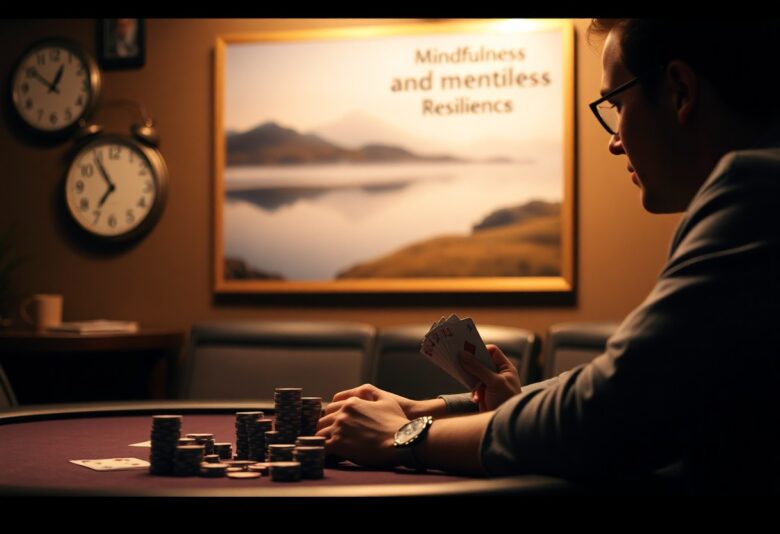Most poker players face the challenge of tilt, where emotional instability leads to poor decision-making and significant losses. In this guide, we will explore effective mindfulness techniques and strategies to enhance mental resilience. By incorporating these proven tools into your gameplay, you can develop a more focused mindset, enabling you to cope with stress, control your emotions, and maintain your performance under pressure. Discover how cultivating awareness can transform your poker experience and help you emerge victorious at the tables.
Understanding Mindfulness
Mindfulness is the practice of being fully present and engaged with the current moment, free from distraction or judgment. This state fosters a mental attitude that is aware and accepting, helping players to maintain focus during high-pressure situations like those experienced at the poker table. By cultivating mindfulness, players can better manage their emotions and stay resilient against the challenges of tilt.
Definition and Importance
Mindfulness, in a psychological context, refers to the awareness of the present moment’s experiences without self-criticism. Its significance lies in enhancing a player’s ability to recognize emotional triggers and reactions while playing, thereby reducing impulsivity and improving decision-making. Enhanced mindfulness is directly linked to improved mental resilience.
Types of Mindfulness Techniques
Several techniques can help develop mindfulness skills vital for poker. They include breathing exercises, body scans, and mindful observation. Each approach serves to anchor players in the present, helping manage stress and emotional turbulence during gameplay. Strategies like these allow players to navigate their internal landscapes more effectively.
| Technique | Description |
| Breathing Exercises | Focus on your breath to cultivate calmness. |
| Body Scans | Acknowledge physical sensations to enhance awareness. |
| Mindful Observation | Observe surroundings without judgment. |
| Gratitude Journaling | Write down things you are grateful for. |
| Guided Meditation | Use resources to lead meditation sessions. |
- Breathing Exercises can lower stress levels effectively.
- Body Scans enhance your connection with physical sensations during play.
- Mindful Observation helps to ground you in the moment.
- Gratitude Journaling can shift focus from negative to positive.
- Guided Meditation is useful for beginners needing direction.
Assume that incorporating these techniques into your routine can lead to significant improvements in mental clarity and emotional balance while playing. The right approach can yield transformative results.
| Gratitude Journaling | Write down things you appreciate regularly. |
| Visualizations | Imagine successful outcomes before they happen. |
| Mindful Eating | Focus on the flavors and textures of your food. |
| Movement Practices | Incorporate yoga or tai chi to enhance mindfulness. |
| Nature Walks | Engage with natural surroundings to find calm. |
- Gratitude Journaling develops a positive mindset.
- Visualizations prepare your mind for success.
- Mindful Eating can improve focus and presence.
- Movement Practices like yoga can reduce tension.
- Nature Walks can reset your mental state.
Assume that these supplementary techniques can create more balance and awareness in your poker strategy. Integrating them into your practice will support your journey towards improved performance.
Mental Resilience in Poker
Mental resilience is integral for success in poker, enabling players to navigate the emotional tumult that often arises during games. Those who excel mentally are better equipped to withstand losses, adapt strategies, and maintain focus. By cultivating resilience, players can significantly reduce the detrimental effects of tilt, allowing for improved decision-making and a stronger overall performance.
Key Factors Influencing Mental Resilience
Several factors contribute to a player’s mental resilience in poker. Understanding these can empower players to enhance their game:
- Emotional Regulation: The ability to manage emotions effectively.
- Self-Awareness: Recognizing one’s thought patterns and triggers.
- Practice and Experience: Gaining familiarity with high-pressure situations.
- Support Systems: Establishing a network of fellow players and mentors.
Thou will find that cultivating these factors transforms gameplay.
Proven Benefits of Mental Resilience
The benefits of developing mental resilience are multifaceted and directly impact a player’s performance. Players with high resilience tend to make fewer impulsive decisions, recover more quickly from losses, and maintain focused concentration during lengthy sessions. They are also more adept at learning from mistakes, fostering a growth mindset that contributes to long-term skill development.
Statistics from various studies reveal that players who actively work on their mental resilience can improve their win rates by upwards of 10%. Moreover, these players often report a higher degree of enjoyment in the game, as they experience less stress and frustration. By embracing mental resilience, players unlock their true potential, allowing them to face the inevitable ups and downs of poker with confidence and poise.
Tips for Building Mindfulness and Resilience
Developing mindfulness and mental resilience is crucial for poker players seeking to overcome tilt. Start by incorporating simple yet effective daily practices. Meditate for at least 10 minutes each day, focus on your breathing, and maintain a journal to reflect on your thoughts and emotions during gameplay. Engage in regular physical activity and prioritize proper sleep. Cultivating a supportive community can also reinforce your efforts. This combination of strategies contributes to enhanced focus and emotional stability at the poker table.
- Meditation and breathing exercises
- Journaling experiences and emotions
- Regular exercise for stress relief
- Sleep hygiene for cognitive clarity
- Community support for shared learning
Effective Mindfulness Practices
Incorporate mindfulness into your routine by practicing deep breathing and guided meditations. Focus on your physical sensations to ground yourself during tense moments. Techniques such as the BODY scan can increase awareness of stress points, enabling you to release tension consciously. This gradual immersion into mindfulness not only aids in staying present but also enhances your overall poker performance.
Strategies for Enhancing Mental Resilience
Building mental resilience involves embracing challenges and learning from losses. Adopt techniques like positive reframing, where you view setbacks as opportunities for growth, and establish clear, achievable goals that lead to a sense of accomplishment. Foster a growth mindset that focuses on evolving skills over time. This continual adaptation allows you to handle pressure and recover from emotional setbacks more effectively.
Implementing these strategies requires commitment and patience, as flexibility in thinking and adaptability to change are key. For instance, using visualization techniques can prepare you mentally for various scenarios at the poker table. Additionally, engaging in supportive discussions with fellow players can drown out negativity while amplifying constructive feedback. Building a strong foundation of resilience means acknowledging vulnerabilities and transforming them into strengths over time, ultimately fostering a dynamic approach to the game. This resilience will better equip you to face the evolving demands of poker with confidence.
Step-by-Step Guide to Overcoming Tilt
| Step | Description |
|---|---|
| 1. Recognize Triggers | Identify the specific situations or actions that consistently lead to feelings of tilt. |
| 2. Acknowledge Emotions | Practicing self-awareness helps in acknowledging your feelings before they escalate. |
| 3. Implement Mindfulness | Use mindfulness techniques to maintain calm and focus during challenging moments. |
| 4. Take Breaks | Step away from the table to regain composure and clear your mind. |
| 5. Reflect | After your session, analyze your gameplay and emotional responses for continuous improvement. |
Recognizing Signs of Tilt
Identifying the signs of tilt is imperative for intervention. Common indicators include increased frustration, impulsive decisions, and a noticeable drop in focus. Players may find themselves more emotionally reactive, with swings in mood affecting their gameplay. Recognizing these patterns allows for timely action before tilt escalates further.
Implementing Mindfulness in Real-Time
Mindfulness can be integrated into poker sessions through focused breathing, visualization, and body awareness techniques. By taking a moment to breathe deeply and assess your current emotional state, you can reduce high levels of stress and ground your thoughts. Professional players often use visualization to see themselves handling high-pressure scenarios calmly, reinforcing a positive mindset.
Practicing mindfulness in real-time means incorporating simple techniques during play. For instance, when feeling overwhelmed, pause and take three deep breaths. Visualizing a peaceful scene or mentally reciting affirmations can also anchor your thoughts. This immediate response helps reduce anxiety and restores focus, allowing players to make more rational decisions and diminish the grip of tilt.
Pros and Cons of Mindfulness in Poker
| Pros | Cons |
|---|---|
| Improves emotional regulation | Can be challenging to implement consistently |
| Enhances focus and concentration | May lead to over-analysis |
| Reduces tilt and anxiety | Requires time and effort to see results |
| Increases resilience to setbacks | Not a substitute for skill improvement |
| Promotes a positive mindset | Potential for misunderstanding core principles |
| Encourages a deeper understanding of self | May conflict with competitive intensity |
Advantages of Practicing Mindfulness
Engaging in mindfulness can significantly enhance a player’s performance by fostering a state of calmness and equanimity. It enables players to maintain focus, preventing distractions from affecting crucial decision-making moments. Mindful players tend to manage their emotions better, leading to reduced instances of tilt, while simultaneously fostering a more positive and resilient mindset that can transform their approach to setbacks.
Potential Drawbacks and Misconceptions
Practicing mindfulness isn’t without its potential drawbacks and misconceptions. Some players might assume that simply being mindful will yield immediate results, overlooking the need for consistent practice and integration into their poker routine. Additionally, while mindfulness promotes calmness, it may unintentionally contribute to an over-analytical mindset that could hinder quick decision-making.
Moreover, there exists a misconception that mindfulness can replace technical skill development. Many players probe mindfulness practices believing it will instantly elevate their game, only to find that without refining their strategies and understanding the game mechanics, they still struggle at the tables. It’s crucial to view mindfulness as a complementary tool rather than a standalone solution, requiring regular practice and balance with ongoing skill improvement.
Additional Resources for Players
Recommended Books and Courses
Books such as “The Mental Game of Poker” by Jared Tendler provide practical strategies for boosting mental resilience, while courses like “Mindful Poker” offer structured lessons on integrating mindfulness into your game. Each resource is designed to reinforce emotional stability and decision-making under pressure, helping players cultivate a winning mindset.
Online Communities and Support Groups
Online forums and support groups create a space for players to share their experiences and strategies in dealing with tilt. Engaging with others who face similar challenges fosters a supportive environment where players can learn from real-life scenarios and gain insights into effective coping techniques.
Online communities such as the TwoPlusTwo forums and Reddit’s r/poker feature vibrant discussions on mental resilience and mindfulness, with thousands of active members. Participating in these platforms can provide players with access to expert advice, personal stories, and specialized subgroups focused on managing tilt. Furthermore, many communities host webinars and live Q&A sessions with professionals, reinforcing connections and expanding knowledge. These supportive networks encourage players to share struggles and celebrate wins, contributing to a holistic approach to personal growth in poker.
Summing up
Presently, integrating mindfulness and mental resilience techniques can significantly enhance a poker player’s ability to manage tilt. By cultivating present-moment awareness and emotional regulation, players can improve decision-making processes and maintain focus under pressure. Employing proven strategies such as deep breathing, visualization, and reflective journaling contributes to a more robust mental framework. Ultimately, developing these skills not only boosts performance at the poker table but also enriches overall mental well-being, fostering a balanced and thoughtful approach to the game.
FAQ
Q: What is the role of mindfulness in improving poker performance?
A: Mindfulness helps players maintain focus and stay present during games, reducing distractions and anxiety. This enhanced concentration allows for better decision-making and strategic thinking, ultimately leading to improved performance in high-pressure situations.
Q: How does mental resilience affect a poker player’s gameplay?
A: Mental resilience allows players to cope with the emotional ups and downs of poker, such as bad beats or losing streaks. It helps players bounce back from setbacks, maintaining a positive mindset and making rational decisions rather than impulsive reactions during challenging moments.
Q: What are some proven tools for developing mindfulness and resilience in poker?
A: Effective tools include meditation practices to enhance focus, cognitive reframing techniques to shift perspectives on losses, and visualization exercises to anticipate various game scenarios. Regularly incorporating these practices into training can significantly improve both mindfulness and mental resilience.




